The good news about television in 2022 is that it gave us a lot to celebrate – too much encapsulate in one short list, at least in a way for one person with limited time to do them justice. That makes selecting a very few of the best episodes supremely difficult.
I've been tasked with selecting six – six! – installments of television that stand above the rest and to be honest, the challenge nearly brought me to tears.
That means plenty of episodes that you love aren't going to show up here.
Some shows served up seasons that were uniformly excellent enough to defy selecting just one episode; for me, this list includes "Andor," "Abbott Elementary," "Severance," "Pachinko," "Atlanta," and "What We Do in the Shadows." See? There are six more shout-outs for you.
Anyway, here are the usual disclaimers: Evaluations like this are highly subjective and must acknowledge that one person can't see every show. That means if your favorite episode doesn't show up here, that doesn't negate its quality. It may simply mean I either haven't watched it yet, or I don't remember it, or maybe we simply disagree.
Regardless, it's always better to face the dilemma of too much TV greatness than howl at the paucity of options. With that, here are six of what I consider to be the best installments of TV storytelling in 2022, in alphabetical order.
"Barry," "710 N" (HBO)
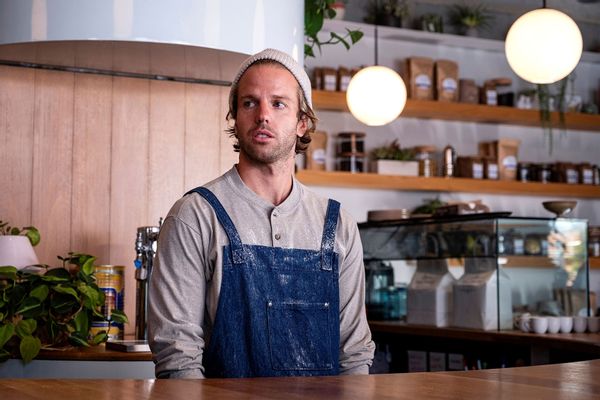 Tom Allen in "Barry" (Merrick Morton/ HBO)
Tom Allen in "Barry" (Merrick Morton/ HBO)Beignets are the hot snack these days, but the ones in this episode hold a mystical power to them. That's one way to explain why Bill Hader's hitman does everything in his power to hang on to the ones he's scored from Beignets by Mitch as he evades a team of motorbike assassins trying to wipe him on a Los Angeles freeway. The title tells you which one but reveals absolutely nothing about the mind-reeling chase that emerges out of nowhere and cements Hader's directing expertise.
As Barry weaves in and out of gridlocked traffic, gently singing to himself, each of his pursuers falls away in absurd accidents, the most ludicrous culminating in a perversely ridiculous stand-off at a car dealership.
And this isn't even the central shock.
"710 N" succinctly encases everything stunning and sinister about the ease with which this show marries comedy, tension, and tragedy, with Barry's deteriorating psychological stability leaving flakes of poison wherever he goes. He's kidnapped his mentor, has vivid fantasies about shooting his girlfriend Sally (Sarah Goldberg) between the eyes, and is being hunted by his former handler.
Meanwhile, Sally's boss bitch façade crumbles after her TV show is unceremoniously canceled minutes after its debut; separately, Barry's one-time ally NoHo Hank (Anthony Carrigan) sees the L.A. crime syndicate he's trying to establish crumble to powder almost instantly.
All their paths lead to Beignet by Mitch, where the customers submit to unreasonably long lines to enjoy the deep-fried pockets of heaven and receive advice from its stoner sage of an owner (Tom Allen). Transitioning between their storylines, along with a bizarre subplot involving Stephen Root's Monroe Fuches finding shelter on a rustic ranch, could have felt like whiplash.
But Hader's confident directing in this episode merges the episode's wild swirl of hysteria with balletic grace, distilling all the qualities that make "Barry" unpredictable, tragic and wonderful into one perfect, transformational bite.
"The Bear": "Review" (FX on Hulu)
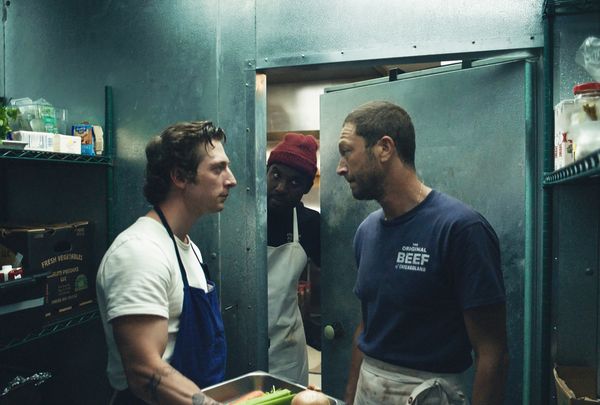 Jeremy Allen White as Carmy Berzatto, Lionel Boyce as Marcus, Ebon Moss-Bachrach as Richie Jerimovich in "The Bear" (FX)
Jeremy Allen White as Carmy Berzatto, Lionel Boyce as Marcus, Ebon Moss-Bachrach as Richie Jerimovich in "The Bear" (FX)There may be no more effective critic bait or cinematic flex than the extended tracking shot, wherein an episode's director of photography captures an extended section of action and dialogue in a single take. DPs have been doing these for decades, but only recently has there been a market for showering praises on shows that pull them off.
That said, while a person might be tempted to simply give the show's director of photography Andrew Wehde style points for pulling off a 19-minute single-take without a hitch, the technique's use in "Review" is integral to telling the story. Every episode leading up to this one is an exercise in stress levels building between head chef Carmy (Jeremy Allen White), sous chef Sydney (Ayo Edebiri), and the place's manager Richie (Ebon Moss-Bachrach) over the fate of The Original Beef of Chicagoland, the sandwich joint Carmy's brother left to him after he died.
A positive review for their hole-in-the-wall takeout joint collides with a technological slip-up: Sydney, who convinced them to join a tech-based to-go service accidentally left the preorder option open, allowing dozens of orders to tumble in. The episode's 20-minute length corresponds with the amount of time the crew has before the lunch rush pummels them; using the tracking shot places the audience in the crush of The Beef's kitchen as the trio's panic sets in. The camera is the lead dragging us through an escalating heart event in tandem with a psychological break, placing us into the sweaty anarchy of a workplace implosion. By the time one of the character's rage boils over, resulting in a serious assault, the only way to greet it is with wild-eyed laughter, followed by an appreciative afterglow.
"Better Call Saul": "Plan and Execution" (AMC)
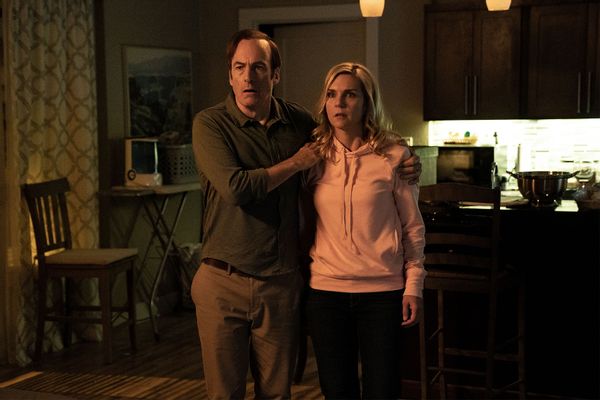 Bob Odenkirk as Saul Goodman, Rhea Seehorn as Kim Wexler in "Better Call Saul" (Greg Lewis/AMC/Sony Pictures Television)
Bob Odenkirk as Saul Goodman, Rhea Seehorn as Kim Wexler in "Better Call Saul" (Greg Lewis/AMC/Sony Pictures Television)Peter Gould gave television one of its greatest gifts in the story of Jimmy McGill, providing a view of moral devolution that's largely his own doing. Bob Odenkirk's portrayal of "Slippin' Jimmy," the low-rent con artist who transforms into criminal lawyer Saul Goodman, is a work of stunning pathos interrupted by bursts of comedy.
A person can see why Rhea Seehorn's Kim Wexler, the daughter of a con artist devoting her life to playing it straight, would be seduced by this kind-hearted trickster. But while Kim fell for Jimmy, she could take or leave Saul, a swaggering shyster who bends and breaks the law for evil men.
This is the episode that proves how risibly unrealistic Kim's efforts to negotiate between two sides of the same man, especially knowing that each serves different masters. A long con she and Jimmy concoct to embarrass their stick-in-the-mud former boss Howard Hamlin (Patrick Fabian) violently collides with the dangerous cartel boss to whom Saul Goodman answers, Lalo Salamanca (Tony Dalton).
"Better Call Saul" constantly reminds us that the most locked-down strategies can never be fully guarded against chaos, especially the type Lalo personifies – the kind that enters places uninvited and upends one's life. But this episode's left-field climax is shocking even by the greater Gilliverse's standards, and explains how accidental collateral damage can murder what's left of a person's spirit.
"Plan and Execution" is a midseason finale, but it's also the most exceptional and definitive kick-off to a story ending you'll see on TV in any year.
"Hacks," "The Captain's Wife" (HBO Max)
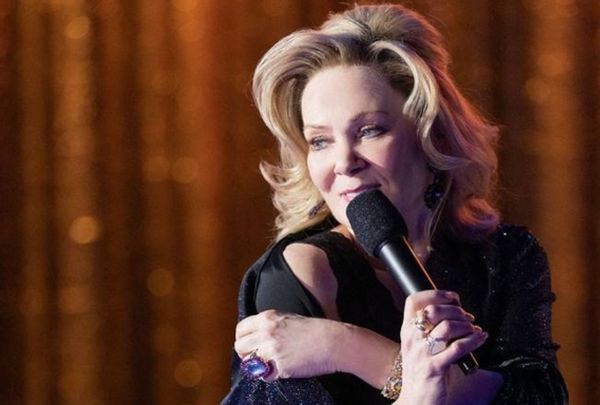 Jean Smart in "Hacks" (Karen Ballard/HBO Max)er
Jean Smart in "Hacks" (Karen Ballard/HBO Max)erIf you want to find out who a person really is, go on vacation with them. "Hacks" creator Lucia Aniello, Jen Statsky, and Paul W. Downs kick the tires on that theory by dethroning veteran comic Deborah Vance (Jean Smart) from her position as Queen of the Vegas Strip and rolling her and her mentee-slash-assistant Ava (Hannah Einbinder) out on America's highways and byways to test out new material.
The beating heart of "Hacks" is the strong intergenerational bond Ava and Deborah share, a two-woman team of rivals who, for reasons nobody else can understand, are devoted to each other.
Season 2 deepens that relationship as surely as it tests it, forcing Deborah far outside of her comfort zone and into the wilderness, figuratively and literally. Outside of Sin City, most people have forgotten who she was. The ones who remember her don't necessarily look back on their time with her through a rose-colored lens, as she finds when her hand of the queen Marcus (Carl Clemons-Hopkins) books her as a headlining act on a lesbian cruise.
At first, she's livid, presuming that lesbians detest her. Then she's pleasantly surprised and flattered to find out that they don't – until she reminds them that they should be by cracking a string of casually homophobic jokes before crashing down the curtain by throwing a shoe at a heckler. Soon after the ship that she boarded with a royal welcome sends her off to the nearest port in a dinghy. A humiliating experience, but it also opens a fresh path to an act that revitalizes her career. It's a real journey but, unlike most shows, one for which we were delighted to tag along.
Want more great food writing and recipes? Subscribe to Salon Food's newsletter, The Bite.
"Reservation Dogs": "Offerings" (FX on Hulu)
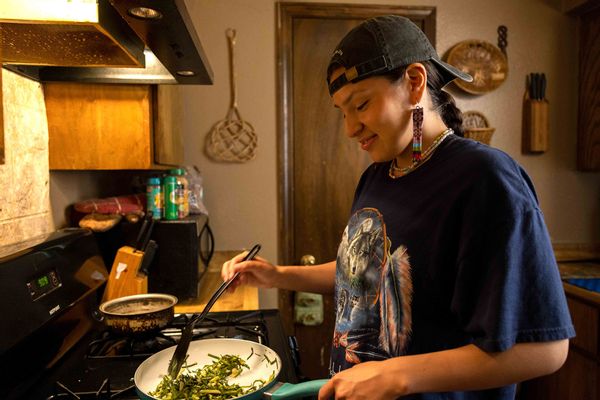 Paulina Alexis as Willie Jack in "Reservation Dogs" (Shane Brown/FX)Elva Guerra as Jackie and Devery Jacobs as Elora Danan in "Reservation Dogs" (Shane Brown/FX)
Paulina Alexis as Willie Jack in "Reservation Dogs" (Shane Brown/FX)Elva Guerra as Jackie and Devery Jacobs as Elora Danan in "Reservation Dogs" (Shane Brown/FX)Sterlin Harjo loves coming-of-age movies. Through "Reservation Dogs," we view his appreciation for the power of scripts and stories, whether they come to us onscreen or are passed down from elders to youths.
The show introduces Bear (D'Pharaoh Woon-A-Tai), Elora Danan (Devery Jacobs), Willie Jack (Paulina Alexis), and Cheese (Lane Factor), as a type of outlaw crew that we know now was a misdirect. A subterranean river of grief flowed underneath the plot's sly comedy from the beginning, although Harjo and the writers wait until the second season for it to soak into its loam.
In this round of episodes, he and his writers broaden that concept to look at how personal losses change a community's history, and how one tragedy in the past can ripple through time in unpredictable ways.
The death of Elora's grandmother Mabel revives the community's sorrow over losing her mother Cookie. "Offerings" writer Migizi Pensoneau connects that thread back to the foursome's loss of their friend Daniel through Willie Jack: She receives a letter Daniel wrote to himself during freshman year from a teacher, and brings it to Daniel's grieving mother, Hotki (played by Lily Gladstone), who currently serving time in prison.
Willie Jack and Hokti used to be close, but Daniel's death changed that – except for the intervention of a guardian spirit only Hokti sees. At that spirit's urging, Hokti passes their family's connection to generations of healers to Willie Jack, charging her with fixing the growing rift between Bear and Elora Danan.
"Offerings" brims with many moods, a feeling fixed in place by Gladstone's portrayal of Hotki's emotional withdrawal, until that transcendent sight of generations of spirits laying hands on Willie Jack parts the shadows. Alexis' tears at her character's accepting the weight of their guardianship amplify the moment's power, reminding us that however unmoored we may feel, we're never alone if we draw strength from the stories those who came before us.
"Yellowjackets": "Doomcoming" (Showtime)
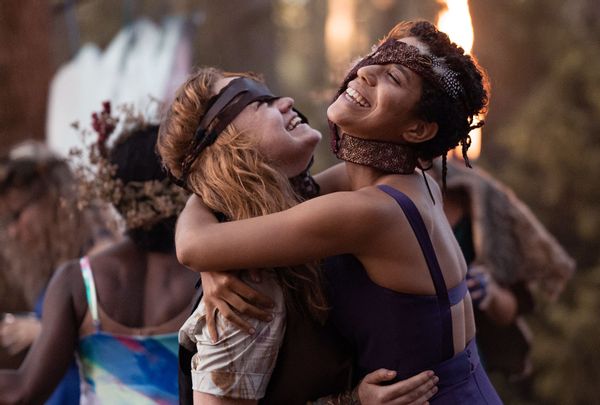 Liv Hewson as Teen Van and Jasmin Savoy Brown as Teen Taissa in "Yellowjackets" (Kailey Schwerman/SHOWTIME)
Liv Hewson as Teen Van and Jasmin Savoy Brown as Teen Taissa in "Yellowjackets" (Kailey Schwerman/SHOWTIME)Survival takes various forms. For a teenage girl in 1996 trying to stay alive after a plane crash strands her and her soccer teammates in the Canadian wilderness, the focus is on the basics: securing food, water, and a means of staying warm once the bitter winter sets in.
When that girl makes it to womanhood and remains dogged by questions as to how she made it out 25 years after the fact, survival may take on a psychological meaning or be considered in political and social terms. This drama excels in linking past to present over its first season, but no episode better delineates the first division between the before of who they are and the snarling after than the outdoor high school dance they plan as a last gasp.
With resources running low and no sign of rescue, the young women resolve to accept their fate by scrounging together formalwear and decorations out of the wreckage, planning to get drunk on booze made from foraged berries that have rotted. But once psychedelics are accidentally introduced, the mood turns from innocently euphoric to feral to menacing, as internalized grievances erupt and the team divides into rival packs, culminating in a bone-chilling hunt.
The first season slowly wove a mystery web connecting threads of the past to the present, offering new questions to ask when it answers old ones. But in the main, the show's allure rests in its stalwart performances, each inspired by their character's sense of knowing what they're capable of in the best sense of that phrase and the worst – and what can happen if whatever internal forces that they're holding at bay are unleashed.


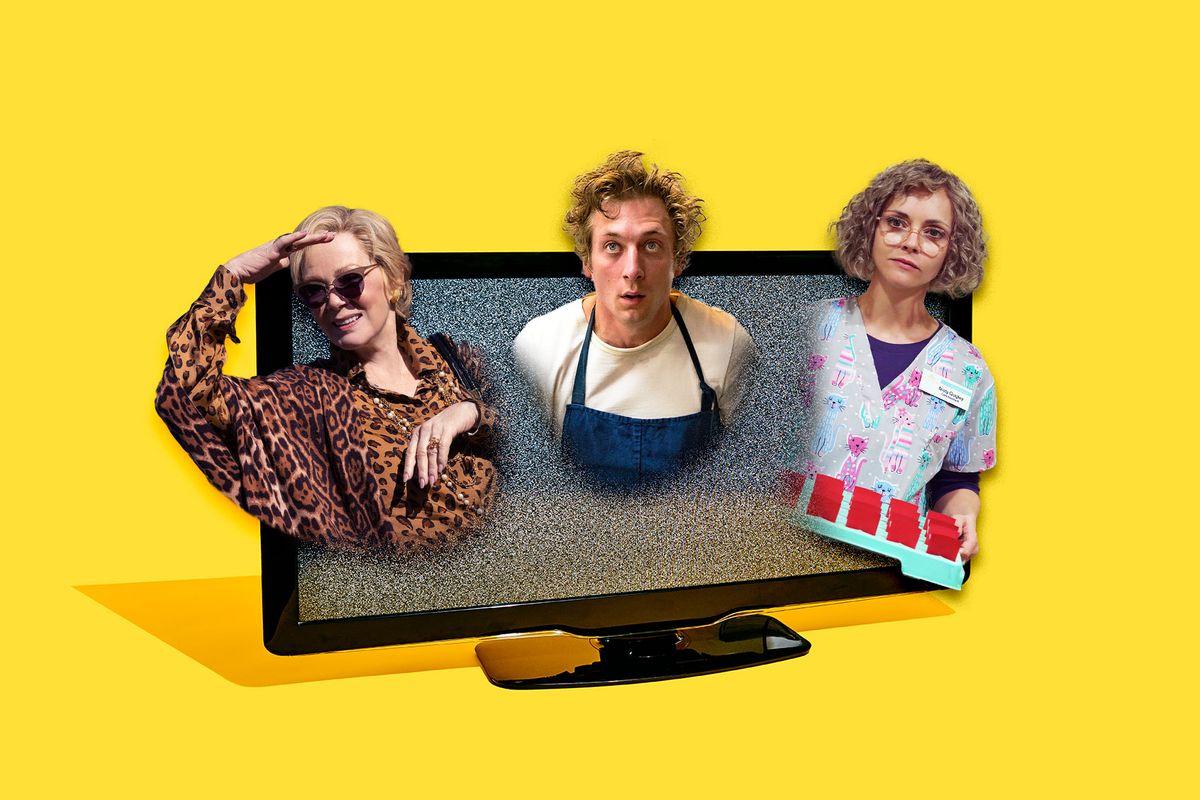
Shares